Arxiv-sanity-X: A robust enhancement of the arXiv-sanity-lite website that significantly expedites the process of academic research. It diligently polls the arXiv API for new papers, enabling users to conveniently tag papers of interest. Based on SVMs over tf-idf features of paper abstracts, it recommends novel papers for each tag. Users can set up keywords that the system will automatically track, enabling a personalized academic journey. The elegant web user interface allows for seamless searching, ranking, sorting, and analysis of results. Uniquely, Arxiv-sanity-X can dispatch daily emails containing recommendations for new papers based on your tags and keywords. Manage your tags and keywords, stay abreast with recent papers in your area, and never miss an important update!
Install via requirements:
pip install -r requirements.txtIn the first place, create and setup your config in vars.py, a template is in vars_template.py:
# database
DATA_DIR = "data" # !put it on an ssd for speed
# email
from_email = "your_email@mail.com"
smtp_server = "smtp.mail.com"
smtp_port = 465 # 25 for public, 465 for ssl
email_username = "username"
email_passwd = "passwd"To run this locally I usually run the following script to update the database with any new papers. I typically schedule this via an apscheduler:
from apscheduler.schedulers.blocking import BlockingScheduler
import subprocess
def fetch_compute():
subprocess.call(["python", "arxiv_daemon.py", "-n", "2000", "-m", "1000"])
subprocess.call(["python", "compute.py"])
def send_email():
subprocess.call(["python", "send_emails.py", "-t", "1.5"])
scheduler = BlockingScheduler(timezone="Asia/Shanghai")
scheduler.add_job(fetch_compute, "cron", day_of_week="tue,wed,thu,fri,mon", hour=14)
scheduler.add_job(
send_email, "cron", day_of_week="tue,wed,thu,fri,mon", hour=15, minute=30
)
scheduler.start()You can see that updating the database is a matter of first downloading the new papers via the arxiv api using arxiv_daemon.py, and then running compute.py to compute the tfidf features of the papers. Finally to serve the flask server locally we'd run something like (or see up.sh):
gunicorn -w 4 -b 0.0.0.0:5000 serve:appFor safety, setup your key by
import secrets;
secrets.token_urlsafe(16)and put it into secret_key.txt.
All of the database will be stored inside the data directory. The entire database of papers will be load into the memory for fast operation of the website. An SSD device is recommended for faster database querying.
(Optional) Finally, if you'd like to send periodic emails to users about new papers, see the send_emails.py script. The primitive SMTP method is used.
MIT
